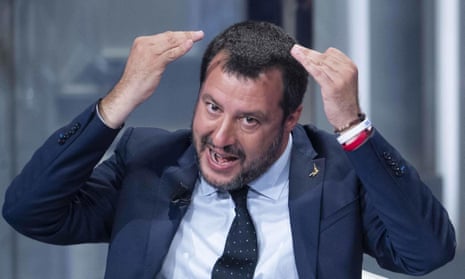A simmering row over the rule of law and the independence of the judiciary in Italy has erupted after the far-right interior minister publicly singled out three magistrates who have challenged his hardline anti-immigration policies.
In an escalation of his battle with the judges and the courts, Matteo Salvini said he would ask the state attorney to examine whether the magistrates should have abstained from passing verdicts in cases involving immigrants because their opinions conflict with government policy on security and immigration.
Luciana Breggia, a judge in Florence, and Matilde Betti, a judge in Bologna, had refused to accept an interior ministry appeal against rulings that allowed asylum seekers to be enrolled onto the civil registry of their respective cities. Rosaria Trizzino, the president of Tuscany’s regional administrative court, had vetoed the creation of so-called “red zones” – areas cordoned off against petty criminals – in Florence.
Salvini said that proof of the women’s pro-migrant sympathies could be gleaned from online searches that revealed they had participated in debates about migration and presentations of books on the topic, or collaborated with magazines that focus on law and immigration.
Salvini has previously taken aim at Breggia, suggesting in a Facebook post last week that if she wanted to change laws she should stand for election. More than 4,500 people responded to the post, and many of the comments contained death threats against the judge.
Salvini’s spokesperson said: “It’s not about listing or cataloguing. They have issued judgments against the interior ministry and have publicly lined up against government policies. It’s all open and verifiable on Google.”
None of the women were available for comment on Thursday, but Silvia Albano, a Rome judge and board member of the National Magistrates Association, said Salvini’s move was a very serious matter.
“The statements of the interior minister are intimidating, threatening and undermine not only the rule of law but the values of the Italian constitution,” she said. “Threatening the freedom of judges means threatening the freedom of all citizens, not to mention coming from an interior minister who, as such, should guarantee the security of magistrates.”
Carlo Sorgi, a judge in Bologna who knows Betti well, said: “This is very bad – magistrates have the right to have an opinion and this seems to be a move [toward suppressing] that. Betti is a brilliant magistrate and well esteemed across Italy. You can check that on Google.”
Sorgi, who is also secretary of the Bologna unit of the Democratic Judiciary association, was among 60 magistrates in the city who signed a petition in January against Salvini’s policies, which have included closing the ports to migrant rescue ships, evicting people from refugee centres and dismantling integration projects.
“It was to show humanity,” he said.
This is not the first time Salvini, who is also deputy prime minister and leader of the far-right League, has publicly lambasted judges for failing to toe his political line. He mocked Gerardo Boragine, a judge in Lucca, on Facebook in December for acquitting 27 protesters who had thrown eggs at him during a rally. Boragine was given police protection after the post triggered death threats.
Luigi Patronaggio, the chief prosecutor in the Sicilian city of Agrigento, was also given a police escort a few months earlier after receiving an envelope containing a bullet in the post. Patronaggio had placed Salvini under investigation for kidnapping after he refused to allow 177 migrants to disembark from a coastguard ship, leaving them stranded at sea for almost two weeks.
Salvini persistently boasts about how his closed-ports tactic has stopped people arriving in Italy by sea and reduced the number of drownings. IHe tweeted in May: “In 2019, there have only been two deaths in the Mediterranean”.
International Organization for Migration estimates also published in May put the figure at more than 500.
A study by the Institute for International Political Studies, an ltalian thinktank, based on interior ministry figures, showed that one in eight people attempting the crossing from Libya between January and April had died en route.
A boat carrying about 80 people sank off the coast of Libya on Wednesday, according to the German NGO Seawatch. The charity posted a photo on social media of a semi-deflated dinghy and people in the sea. “Many people in the water, high probability of people missing and deaths by drowning,” the charity said.
